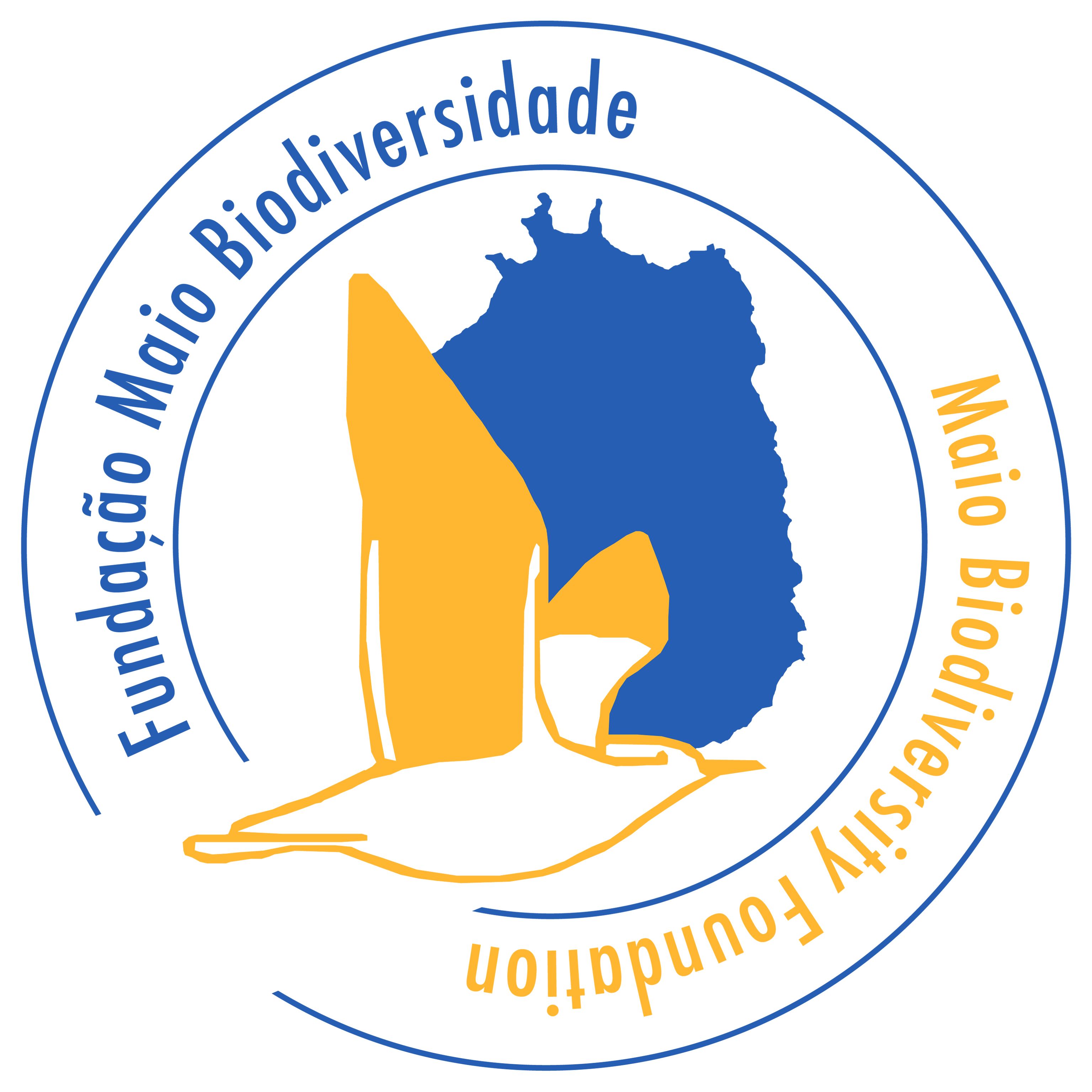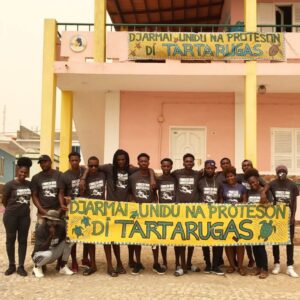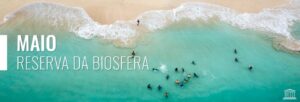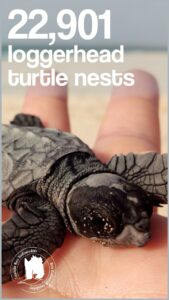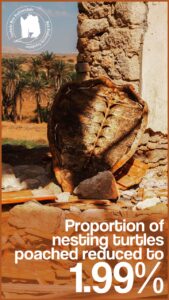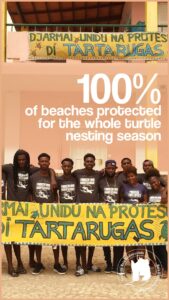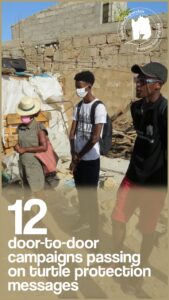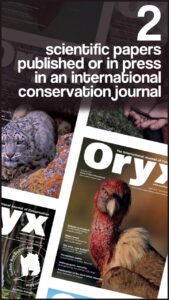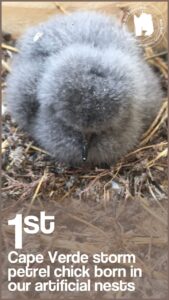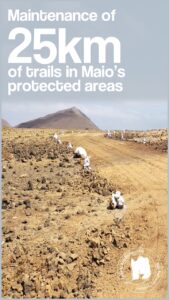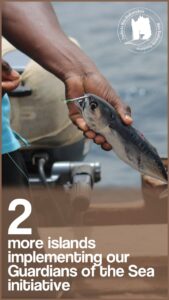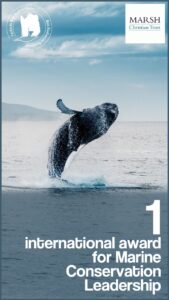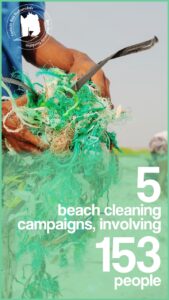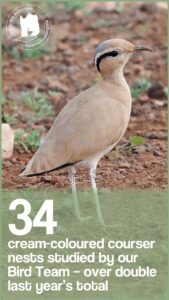On this first week of 2021, Maio Biodiversity Foundation wants to wish you all a happy and healthy 2021, as we look back at a slightly chaotic year of achievements, difficulties, and the strength of teamwork!
Turtle protection project
This year was a record year for sea turtles nesting in Maio, and indeed in Cabo Verde. We recorded a total of 22,901 loggerhead turtle nests – which we estimate means that over 5700 female turtles braved the shores of Maio to lay their eggs this year. Despite the unique challenges that this year brought to the turtle protection project, our resilient team, and the people of Maio, rose to the challenge and maintained our protection of the entirety of Maio’s nesting beaches for the whole nesting season. We are particularly grateful to the community groups of Maio, who increased their involvement this year, and without whom we wouldn’t have been able to reach the same level of success. It was also a great year for scientific research on sea turtles in Maio, with 2 scientific articles being published in the journals ‘Oryx’ and the ‘African Sea Turtle Newsletter’, and 2 in print.
The effects of the coronavirus pandemic
If the record number of sea turtles wasn’t enough to keep us busy, the coronavirus pandemic made sure that we had plenty on our plates. It affected Maio as it did everywhere else in the world, and FMB found ourselves closing our offices for the month of April whilst Maio had a month of strict quarantine. Thanks to our partners at FFI, we received a Coronavirus Partner Crisis Relief Fund to replace the support we receive (both financial and volunteering) which was disrupted due to the pandemic. As always, our partners were very flexible and supportive of us as we coped with the fallout of the pandemic, moving some activities around and unfortunately having to cancel some, such as school visits, to keep the people of Maio safe. FMB helped out as much as we could during the quarantine period, distributing aid baskets around the island with the Red Cross and Maio’s Fishing Associations, and working with the National Police to be a central point of contact for emergencies on the island. In December, the team got together to celebrate our Director, Dr Rocio Moreno, for the strength, leadership and support she has shown us all this year under difficult circumstances.
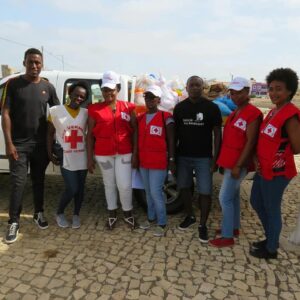
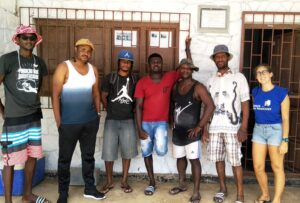
Conservation in context in Maio
Some very encouraging news that we have received this year is the approval of Maio as a UNESCO Biosphere Reserve. This designation means that the Cabo Verdean government is committed to the sustainable development of Maio; enhancing the relationship between its people and the environment; and finding new and innovative ways to strengthen culturally important activities whilst looking after our wonderful biodiversity. FMB played an important part in this designation, as we collected much of the biodiversity data used as evidence for the application, and we also reviewed the application along with our partners on the island.
Just prior to the designation as a Biosphere Reserve, Maio’s Protected Area Management Plan was approved by the Cabo Verdean government. This was a historic moment for FMB, as it was first started in 2013 and we have been involved in updating and reviewing it ever since. We thank our hardworking partners at FFI for their help and support to achieve this, and we look forward to even going one step further in the new year to make FMB’s involvement in managing Maio’s protected areas official… stay tuned and keep your fingers crossed for more news on that in 2021!
The Marine Team
FMB’s marine team had a great year in 2020, and we are very proud that they were recognized by the Marsh Award for Marine Conservation Leadership for their special contribution to marine conservation in Maio. One of the exceptional initiatives for which they were celebrated is the Guardians of the Sea project, which thanks to its success is now being replicated in Sal by our partners Project Biodiversity, and by our partners Bios CV in Boavista. The marine program’s reach also extends internationally to the West Africa IUCN Red List, where FMB was one of only two NGOs in Cabo Verde to provide local knowledge and data to the IUCN shark specialist group for the review and assessment of several shark and ray species.
Some important facts and figures
